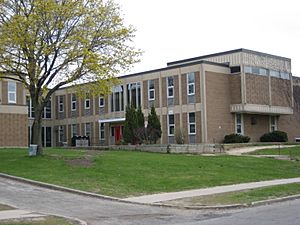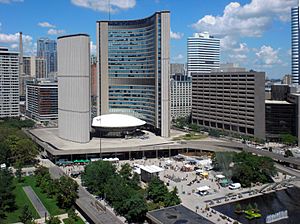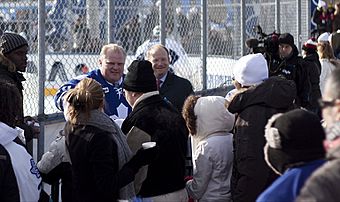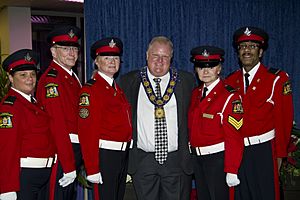Rob Ford facts for kids
Quick facts for kids
Rob Ford
|
|
|---|---|
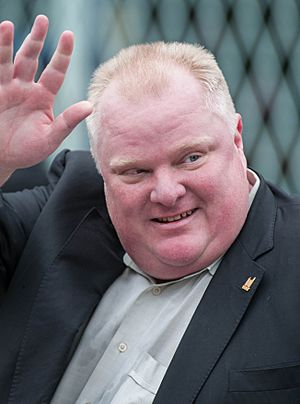
Ford in 2013
|
|
| 64th Mayor of Toronto | |
| In office December 1, 2010 – November 30, 2014 |
|
| Deputy |
|
| Preceded by | David Miller |
| Succeeded by | John Tory |
| Toronto City Councillor for Ward 2 Etobicoke North |
|
| In office December 1, 2014 – March 22, 2016 |
|
| Preceded by | Doug Ford |
| Succeeded by | Michael Ford |
| In office November 14, 2000 – November 30, 2010 |
|
| Preceded by | Ward established |
| Succeeded by | Doug Ford |
| Personal details | |
| Born |
Robert Bruce Ford
May 28, 1969 Etobicoke, Ontario, Canada |
| Died | March 22, 2016 (aged 46) Toronto, Ontario, Canada |
| Resting place | Riverside Cemetery |
| Political party | Independent (2000–2016) |
| Other political affiliations |
Progressive Conservative |
| Spouse |
Renata Brejniak
(m. 2000) |
| Relations |
|
| Children | 2 |
Robert Bruce Ford (born May 28, 1969 – died March 22, 2016) was a Canadian politician and businessman. He served as the 64th mayor of Toronto from 2010 to 2014. Before and after being mayor, Ford was a city councillor for Ward 2 Etobicoke North. He was first elected to Toronto City Council in 2000.
Contents
Early Life and Education
Rob Ford was born in Etobicoke, Ontario, Canada, in 1969. He was the youngest of four children. His father, Doug Ford Sr., co-founded a successful label-making company. His father was also a politician, serving as a Member of Provincial Parliament from 1995 to 1999.
Ford went to Scarlett Heights Collegiate Institute in Etobicoke. He dreamed of becoming a professional football player. He even attended special training camps. After high school, Ford studied political science at Carleton University in Ottawa. He played on the football team but left after one year. He then returned to Toronto and worked at his family's business, Deco Labels.
In August 2000, Ford married Renata Brejniak. They had two children, Stephanie and Doug. The family lived in Etobicoke until Ford's death in 2016.
Political Career in Toronto
Serving as a City Councillor
Ford was a city councillor for three terms, from 2000 to 2010. He represented Ward 2 Etobicoke North. As a councillor, Ford was known for criticizing how other councillors spent money. He often made strong arguments at council meetings.
Ford first ran for Toronto City Council in 1997 but did not win. In 2000, he ran again for Ward 2 Etobicoke North. He won, defeating the current councillor. Ford said that people wanted change, and they got it.
Ward 2 is in the northwest part of Toronto. Many immigrants live there, especially from South Asia. The area has different types of homes, from houses to high-rise apartments.
Ford was re-elected in 2003 with 80% of the votes. In the 2006 election, he won again with 66% of the votes.
Focus on City Spending
During budget talks in 2001, Ford became known for his passionate speeches. The City of Toronto faced a large budget problem. This meant they might need to raise taxes a lot. Ford suggested cutting money from councillors' office budgets. He also wanted to stop using city limousines and club memberships.
Ford believed these changes could save a lot of money. He was one of only four councillors who voted against a 5% property tax increase in 2001. Ford made a point of paying for his own office expenses. He believed taxpayers should not pay for councillors' self-promotion.
Working for Residents
Ford made it a priority to help people in his ward. He often called residents back himself. He also met with city staff to solve problems. In 2005, a radio station tested councillors' response times. Ford was one of the few who called back quickly. He was very dedicated to helping his constituents.
Ford also spoke about city issues like bike lanes. He thought roads were for cars and trucks, not bikes. As a councillor, he opposed new bike lanes on some main streets. As mayor, he worked to remove bike lanes that had been installed. This decision was criticized by people who support cycling.
Running for Mayor in 2010
In 2010, Rob Ford was elected mayor of Toronto. He received 383,501 votes, which was 47% of the total. His main opponents were George Smitherman and Joe Pantalone. About 52% of registered voters participated, which was a high turnout for Toronto.
Ford won in all the areas that used to be suburbs before Toronto became one big city. He ran on a platform of saving taxpayer money and building more subways.
Mayor of Toronto
After winning the election, Ford began his term as mayor. He appointed Doug Holyday as deputy mayor. At his inauguration, television commentator Don Cherry introduced him. One of the first things the new council did was cancel a $60 vehicle registration tax. This was one of Ford's campaign promises.
During his first year, most of the council supported Ford's ideas. He privatized garbage collection in some parts of the city. This meant private companies collected trash instead of city workers. In 2011, there was no property tax increase. In later years, tax increases were kept low. Under Ford, the council voted to make the TTC (Toronto's public transport) an essential service. This means its workers cannot go on strike.
In 2013, the City Council supported Ford's plan to cancel an old transit plan. Instead, they decided to build the Scarborough Subway Extension. This was a major promise from Ford's campaign. This project later received funding from the province and federal government.
Rob Ford's brother, Doug Ford, also served as a city councillor for Ward 2 Etobicoke North from 2010 to 2014. This was during Rob's time as mayor.
2014 Election and Return to Council
Rob Ford planned to run for mayor again in 2014. He participated in several debates. However, in September 2014, he suddenly withdrew from the mayoral race. This was because doctors found a tumor in his abdomen. It was later confirmed to be cancerous.
His brother, Doug Ford, then ran for mayor in his place. Rob Ford decided to run for his old city council seat in Ward 2 Etobicoke North. Doug Ford lost the mayoral election to John Tory. However, Rob Ford won his old council seat with 58% of the votes. His term as mayor ended on November 30, 2014. He had stated that he intended to run for mayor again in 2018.
Personal Life and Interests
Football Coaching
Rob Ford volunteered his time to coach high school football. He coached at Newtonbrook Secondary School starting in 2001. He then coached at Don Bosco Catholic Secondary School until 2013. Ford donated money to help equip the Don Bosco team. He also started a foundation to help other schools fund their football teams.
In 2017, Toronto Mayor John Tory and the Ford family suggested renaming Centennial Park Stadium to Rob Ford Memorial Stadium. This was to honor Ford's coaching. However, the city council voted against this proposal.
Illness and Passing
In September 2014, Rob Ford was admitted to the hospital with severe abdominal pains. Doctors found a tumor. He announced he would not run for mayor again because of his illness.
On September 17, 2014, doctors announced that Ford had pleomorphic liposarcoma. This is a rare form of cancer that grows in fat tissue. Ford was treated with chemotherapy and surgery. After these treatments, Ford announced in 2015 that doctors had cleared him of cancerous tumors.
However, on October 28, 2015, Ford revealed that a new tumor was growing. The next day, his brother Doug confirmed it was cancerous.
On March 17, 2016, Ford's office announced he was in the hospital. His chemotherapy treatment had not been successful. His health was getting worse. The Ford family asked for privacy and thanked people for their well wishes.
On March 21, 2016, Ford was placed into palliative care at Mount Sinai Hospital. He passed away the next day, March 22, at the age of 46.
After his death, Toronto City Hall began a period of mourning. Flags were lowered, and a book of condolences was opened. A public funeral service was held at St. James Cathedral. Ford was buried at Riverside Cemetery in Etobicoke.
Legacy
In September 2017, Toronto Mayor John Tory and the Ford family proposed renaming Centennial Park Stadium after Rob Ford. This was to recognize his contributions. However, the city council voted against the renaming on October 4, 2017.
See also
 In Spanish: Rob Ford para niños
In Spanish: Rob Ford para niños
- Ford family (Canada)
- Crazy Town: The Rob Ford Story, a 2014 book about Rob Ford
 | Aaron Henry |
 | T. R. M. Howard |
 | Jesse Jackson |


